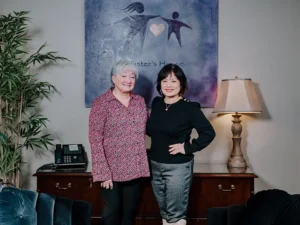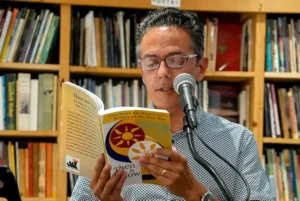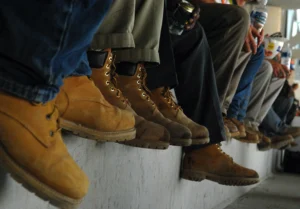
“My UFC Contract Is Just The Beginning”
Getting a contract with the UFC, the world’s largest MMA promotion company, is the ultimate goal of every MMA fighter. 29-year-old Vyacheslav Borshchev knocked his way into the UFC by gloriously defeating his opponent Chris Duncan at the Dana White’s Contender Series tournament. RTM got an exclusive interview with the athlete to find out how a guy from Russia’s far-flung province got into the MMA elite in the U.S, what his family thinks about him being a fighter, and whether he ever feels like giving up.
“The goal must be unrealistic”
Slava, you’ve finally signed your UFC contract! This is a tremendous achievement for an MMA fighter. What does this mean to you: an ultimate achievement of a lifetime or a new stage in your career?
It feels like I finished a chapter, turned the page, and now everything is new again. It was a long and difficult journey. I was striving for this every single day of my career. Every hour of training was aimed at bringing me one step closer to my ultimate goal. And, oddly enough, it happened unexpectedly. I did not see it coming after that fight at Dana White’s tournament. It often happens this way when you invest yourself into something. But getting into the UFC is definitely not an end; it’s just a beginning.
So all your past victories at Russian, European, and world championships were just stepping-stones to a bigger career in sports?
I divide all my steps into before and after. Once I was dreaming of becoming a world champion. I was losing sleep over this goal. Then I became a world champion and… nothing happened. I realized that I needed to strive for something bigger, find a new goal. And it goes like that every time – you reach a desired goal and start all over again by setting up a new goal. You are much more likely to achieve something in life if you set up big goals. Don’t be afraid to dream big. If your goals don’t scare you, they’re not goals at all. I believe that you have to stay rooted in reality but also set the most unrealistic goals. Only then you’ll never stop growing.
There is a rumor that it is easier for Russian athletes to be signed by foreign promotion companies, such as the UFC, since our guys zealously strive for victory and are more motivated to get into the top league. They even wrote about you: “Well, of course, he got a contract, he is Russian after all.” Have you noticed this to be true?
No. In America, we are not discriminated based on ethnicity or nationality. They don’t care about it. This is just business. On the contrary, being Russian made it harder to make it. Russian athletes are incredibly strong, dedicated, and there are a lot of them. The competition was insane! It’s not like they needed another Russian MMA fighter. I had to prove myself worthy. Moreover, if I didn’t know English and couldn’t bring new fans with me, they wouldn’t need me at all. To be honest, it’s not even all about my fighting skills. What’s also important is how many people are interested in my fights. The more people watch my fights, the better.
I don’t think that the fact that I am Russian favored me at all. I have a legendary manager, Urijah Faber, but he is my manager not because I am Russian, but because I am a professional athlete who works hard. In a matter of four years, I became a full-fledged MMA fighter fighting for the most prestigious organization in the world. I had very competitive opponents who could easily sign a contract with the UFC.
And if we talk about the Dana White’s Contender Series, after which I signed my UFC contract, I was an outsider there. I got into a fight with the Scotchman Chris Duncan by accident. His opponent was disqualified based of his weight. No one wanted to fight Duncan. At the time he had seven early victories out of seven fights. There was only ten days left before the fight, too little time to get ready. When Urijah offered me to replace Duncan’s opponent, I immediately agreed. That’s what I’m here for – to fight if challenged.
Why did you choose such a traumatic and dangerous sport as your career?
I engaged in martial arts long time ago and, honestly, I couldn’t imagine my life outside of sports. I have been fighting since I was eight. Initially, my love for martial arts was sparked by movies. I saw the movie “Ali” with Will Smith and realized that I wanted to become a world champion.
Another factor that influenced my choice was my childhood environment. There was a lot of violence in the streets during that time. The best leverage was strength. Perhaps such atmosphere encouraged me to get into sports.
And the final factor that set me on my way to UFC was getting into the sports elite in 2006 when I won the Russian championship among teenagers. That’s when I realized that if you invested a lot of effort into something, you could get results. From that day on, I dedicated my life to sports. I decided that I would achieve my goals no matter what.
What would you say to athletes who are getting discouraged because they are getting defeated?
First, if you are wondering whether to continue or not, you have already failed. There is no need for advice. An ambitious person moves towards their goal even if everyone around them says that they won’t succeed.
Second, there is a saying: “The biggest temptation to give up comes before the triumph.” This is exactly what happened to me before the fight with Chris. But Urijah told me, “No, we are going anyways,” so I did it instead of feeling sorry for myself. And it ended up being the biggest triumph of my life.
Slava, you are now living in Sacramento, USA. Is it impossible for an athlete to build a successful career living in Russia and coming to fight in Europe or the U.S?
Anything is possible, but UFC is the most prestigious organization for fighters. I didn’t have a rich sponsor to fly me around the world or a manager to represent me in the U.S. I had only one choice – move closer to UFC and try to put myself on the map. Initially, I moved to Sacramento because of the UFC. All major tournaments and managers are close to here. Now Sacramento is my second home and I love the people who surround me.
Boxers come across as very aggressive people. Otherwise, how could they beat other people so zealously? You don’t seem that way. How do you manage to manage aggression and not let it spill into other areas of your life?
In MMA it is impossible to be an affectionate person when you are trying to defeat your opponent. Hurting your opponent is the point of this sport. However, you don’t have to be aggressive about it. Aggression is mostly fear. The higher is the level of the athlete the lower is his level of aggression. He simply doesn’t see danger around him. I am a hot-tempered person. I can get angry in a second, but usually, I just laugh it off and then laugh at myself. I never cross the line. Real aggression is born only when there is fear.
Does your wife support you when you’re fighting or is she more worried about you being in the ring?
My wife is very rational in this regard. I am a fighter. I’ve been doing this all my life. She never knew me any other way. Sometimes I’m even curious to see myself through her eyes: she met me as an ordinary guy who was fighting in the streets of Krasnoarmeysky district. Now that guy has turned first into a champion, then into a father. She knows why I’m doing this. I share everything with her and never hide anything. Even when I gave up mentally before my fight with Chris, she told me, “You came this far. Go for it, do your job, and then we’ll figure this out.” And I really liked it. I have never noticed such volitional powers in her. We are a team now, and this is very cool!


















